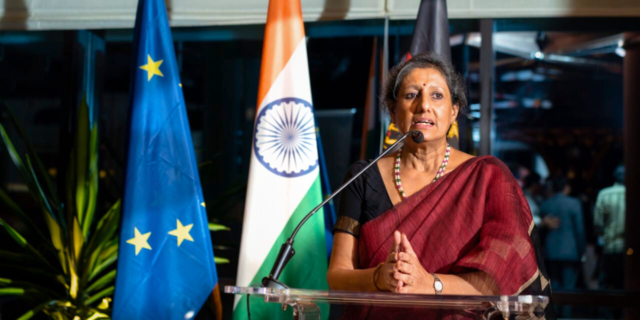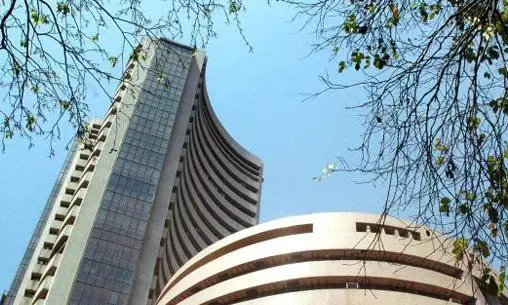Born to two educators, Amita Desai built a passion for teaching early in life. Growing up in Hamburg, Germany, for a significant part of her life, she fondly recalls that in a sense they accepted her as one of their own. Today, she is a representative for the City of Hamburg and the Honorary Consul for the German Embassy Telangana.
She remembers how her father believed that women should be educated, how he supported her mother to pursue two master’s degrees despite having two children. She moved to Hamburg at 11, living for a decade and a half in Europe, pursuing her education in Hamburg and Paris.
She reported developing a passion for collecting the writing of her father, who served as a UN diplomat. She holds fond memories of chancing upon rare articles written by her parents together.
Amita Desai is the director of Geother Zentrum Hyderabad, the cultural wing of the German Embassy operating in Hyderabad. Pursuing her education in English literature from Germany, she has a profound experience as an educator.
She worked as the vice principal of the Vidyaranya School in Hyderabad for a while apart from being leading the institute that has taught the German language to thousands of people in Hyderabad. Additionally, Amita Desai is also the director of the Hyderabad Literary Festival.
Also Read: The forgotten Nizam-era palaces of Hyderabad
Q. What is Goethe Zentrum and what does it do?
A. We are really here to promote the German language and culture. Despite being part of a large worldwide network, it isn’t a foreign entity simply trying to promote something, we try to be relevant for both cultures.
We primarily conduct German language classes and exams. We have qualified teachers who conduct about 10,000 exams a year across schools, classes, and corporate centres.
Apart from the classes, we are also focused on the environment. The Germans have taken this issue seriously, even with the Green Party in the parliament. With experiences from that, we try to see how to draw parallels and make such sentiments relevant in Hyderabad. We are also focused on women’s empowerment, inclusivity, and promoting literature.
We do about 85 events a year ranging from something huge like the World Music Festival, and the Hyderabad Literary Festival and also conduct smaller events. We even hold film screenings at Lamakaan introducing the youth here to films they might not otherwise have access to.
We’re even doing something we last did 18 years ago. ‘My dream, my world’ is a project where we’re sending 10 benches to 10 schools asking the students to fill these benches with their thoughts and dreams. Last time around the benches were put out in public parts in the 16 states of Germany.
We started with two people 20 years ago and had to build everything from scratch. From doing 15 events a year to 15 a month, from teaching about 150 students to about 1,000 now, we have grown. We reach about 1.5 lakh people through our events over the year.
Q. What similarities or similarities do German and Indian cultures share?
A. More than similarities, I’d like to talk about the connections between Indian and German cultures. One such connection lies in language, the newer Indian languages originated from Sanskrit, and German linguistics lean on Sanskrit.
Not the vocabulary, but the grammar and syntax of German takes after Sanskrit grammar. Thanks to that you could have a word describing the ‘red warm rising sun’ in one word in both languages.
I believe that a commonality in language, means there are many more commonalities in cultures. Languages do not form in a vacuum. Languages evolve from their speakers who polish them over and over. Some of the major German writers have written in the backdrop of Indian philosophies including, Hermann Hesse, Günter Grass, and even Goethe himself claims he picked up the essence of what he wrote from the Indian scriptures, like his theory of light.
If you go back a couple of centuries, there is a lot that connects Germany and India. For instance, the scientific temper we share in science and math is a similarity between us, albeit Germany is much more advanced now. We are also a country which believes in the word and the book. We have scriptures dating back millennia. Germany today is responsible for every third publication in the world.
Both cultures respect the written word deeply. Germany and India have a history of 70 years working together. Both, Germany and India are celebrating 75 years of Basic Law and the Constitution, respectively.
Q. How have you seen Hyderabad evolve culturally over the last 20 years?
A. Over the last 20 years, GZH has also completed 20 years, it has been a joy to see Hyderabad soak up all the events we conduct. We once held an event called ‘a wall is a screen,’ where we turned public spaces into walls where played a movie. We started in the Chowmahal Palace parking lot in the old city and also projected a film on a small white wall on top of a small shop.
We carried the projector and speakers on a bandi (vehicle). Imagine German curators watching German films using high-tech instruments operated off a bandi. People would come and go, joining in as they please. That was a beautiful experience of culture in Hyderabad that I remember.
There’s been a tremendous, phenomenally huge change. The city has grown bringing in populations from the nearby districts, other states, and even other countries. With such an influx, there is bound to be a cultural change. Over the decades there have been numerous cultural centres like Manthan and Lamakaan come up. From having no festivals, Hyderabad also hosts an array of festivals like the Kite Festival, Food Festival, Photo Festival, and Jazz Festival among others. You even have a comic con here.
However, Hyderabad has a challenge when it comes to cultural spaces. A theatre performance needs a good venue. We outsource setting up the venue, but it is better to have that infrastructure already. Cultures thrive in such spaces. While there is work being done regarding this, it is not adequate for a city that calls itself cosmopolitan.
While Bengaluru and Chennai have such dedicated spaces, Hyderabad does not have it yet. However, we are getting there.
Also Read: A day aboard Bengaluru Darshini
Q. Why is the German Embassy now interested in the South Indian states?
A. It is a fact that the Southern States have been neglected. The Consul General from Chennai is taking care of Telangana, Tamil Nadu, Kerala, and Pondicherry. Hence, they deemed it necessary to confer me with an honorary consulship for Telangana.
The Southern states have always been important. Bengaluru is a case in point wherein it is India’s IT hub. Similarly, Tamil Nadu has made significant strides in the manufacturing realm. The efforts of many people have put the southern region not just in the spotlight of India but also in the world.
The South also has a great deal of education and research institutes. In fact, the scientists of Germany collaborated with scientists in Hyderabad and Bengaluru before they did up North.
Q. What’s in store for Goethe Zentrum and German-India relations?
A. Germany and India have a long history of 70 years of working together. In that time there’s been a great deal of academic and scientific engagement between both nations. Hyderabad has the highest number of DAAD (German Academic Exchange Service) graduates. The first DAAD office outside Europe was in India. We go back a long way in academia, science, and politics too.
Recently, a large delegation from across fields arrived in India, signing numerous MoUs with the government here. We are also greatly focused on the exchange of skilled services. We have a large number of graduates every year who aren’t able to get employment. Many skilled professionals are happy to migrate to Germany.
The skills can range from butchery and driving to healthcare and engineering. Under the program, the individuals will be taught German not just from the books but also in a practical sense. Apart from the outreach, Germany is seeking a deeper engagement with various governments.
Telangana and Kerala have signed the ‘triple-win agreement’ between the state, Indian, and German governments. Telangana signed it in November 2023, and under the program, we are training professionals to employ them in Germany.
Q. What can you tell us about the upcoming Hyderabad Literary Festival (HLF)?
A. HLF is now among the top five in the country. We are not just restricted to literature, we’ve added streams for indigenous languages and science too. Last year, we also added a new stream called climate conversations which were houseful. Climate impacts all of us. We had people like Rohan Chakravarthy and Anand Gandhi attend the event.
We are happy that we can add this focus to the festival. We also promote visual artists and local artisans who get to display their works. For 2025, Lithuania is the guest nation and the Sindhi is the language of focus.
(Edited by Ananya Rao)








